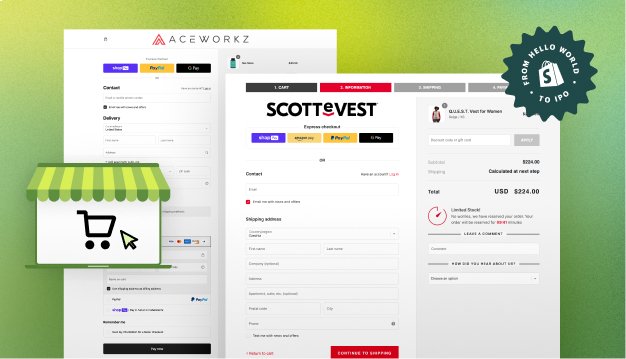
Designing for Success: The Ecommerce Website Development Journey
Ecommerce encompasses a number of different types of businesses and corporations (such as B2B, B2C, C2C, etc) and is becoming one of the most important aspects of the Internet. Nowadays, online commerce accounts for more than 5% of global trade. Large, medium, and small business owners are getting involved in the ecommerce process and realize that the development of marketplaces and sophisticated online stores is at the forefront of business scaling. The creation of marketplaces helps businesses sell products to their customers around the world. Websites break the barrier of geographical location of the business and offer a wide range of audiences and, therefore, the possibility of increasing sales.
Today, almost every company in the world can be found online. If your company doesn’t have a website, it’s surprising and sometimes even suspicious. People find it more convenient to search for services and products directly using their gadgets, so ecommerce is at its peak today. The Internet has up to 24 million active ecommerce websites. And it’s easy enough to get lost among competitors without the right approach to both creating and launching your platform.
What is ecommerce website development?
Ecommerce website development is a complex project, the result of which depends on the experience of developers and customer focus. The main goal of high-quality eCommerce web development is to create a user-friendly platform that will stand out and attract the attention of potential customers. Together with the entrepreneur, IT developers work on the business and technical aspects of the future website. This includes functionality, user interaction, order acceptance and processing, and, most importantly, its visual properties.
As we all know, electronic commerce (ecommerce) is a special sphere of modern economy, which consists of financial and trade operations carried out through computer network solutions, as well as business processes inextricably linked to the conduct of such operations.
Ecommerce is designed to help sell a variety of goods and services through the global network. Websites that carry out these processes are characterized by a number of features that categorize them according to their immediate purpose.
The basic ones are:
- Fully developed personal account (personal data, transaction history, status of new and old orders, payment data and information regarding delivery, loyalty programs, promotions and all kinds of bonuses);
- Mechanisms of connection to payment systems;
- Integration with delivery services;
- Functions for managing discounts and possible markups on products, formation of various types of goods for different categories of customers, setting discounts on reaching a certain price of goods, creation of discount coupons;
- Integration with warehousing platforms.
Real ecommerce platform is a constantly evolving project, the authors of which are aimed at moving exclusively forward. This means that the functionality and parameters of the online store are constantly edited and new technical features are added.
The external display of such websites can also change significantly after some time, but their basic structure and offered functionality remain in the same state.
How much does it cost to develop an ecommerce website?
The cost of creating an online store is formed taking into account a lot of factors and may differ from one solution to another. For example, some developers, especially beginners without experience, can offer services for a couple of hundreds dollars, while the senior level charge tens or even hundreds of thousands of dollars for the project. It all depends on the knowledge, skills, capabilities.
As for web agency, they also offer different prices, and sometimes the difference is significant. As a rule studio offers several plans, each has its own conditions and terms of execution. Generally these are:
- economy – a site on a template costing from $1500;
- business – online store on a template with advanced functionality and / or unique design from $2900-3500;
- premium – customized development from scratch from $7000
Customers can choose the one that suits them best, or agree on individual terms of development with a separate calculation of the cost of the site for the tasks of their business.
The price of ecommerce website development services is calculated taking into account many factors. The main ones are related to the peculiarities of the creation and design of the site. The final cost depends on the volume, complexity of work and time spent.
The price of development includes:
- the cost of hosting and domain;
- type of CMS;
- design features;
- functionality (menus, feedback forms, integration with third-party services, etc.);
- number of language versions;
- layout parameters (volume, markup, optimization, adaptability, etc.);
- programming and testing;
- additional work (content preparation, site filling, promotion).
Another factor that determines the cost of the online store – the presence of corporate identity. If you already have a ready-made color scheme, logo and developed fonts, it will simplify the task of the designer, which means that the time to design will take less, which in turn will reduce the cost of the service. At the same time, if you create unique buttons, unusual transitions, animations, drop-down lists and other interesting elements, the cost of the project will increase.
When creating an online store, a template can be used. This is a layout with a certain number of pages, a minimum set of functions and a ready-made design. This option is considered the simplest, fastest and the most affordable. Suitable for beginners who need to declare themselves.
Template design involves the selection of a suitable color scheme, the choice of fonts and icons appropriate to the type of activity. This solution allows you to get a simple site without integration with payment systems, which will not stand out among competing web resources.
To create an attractive modern design and implement the necessary functionality the template can be finalized. Colors and fonts are selected in accordance with the corporate style or wishes of the customer, as well as additional blocks and elements can be created or replaced.
Online store with a specific style has distinctive features, stands out against the competitors and more likely can be remembered by the audience.
Unique design provides for the elaboration of all elements and blocks taking into account the tasks of a particular business. In this case, customers can realize any idea, develop the functionality necessary to meet the customer’s requirements and user needs.
Individual custom ecommerce website development allows to get an online store with:
- fast loading pages;
- wide spectrum of functionality;
- convenient administrative control panel;
- responsive design.
This is the most expensive variation of development. It all depends on the complexity and peculiarities of the work. Suitable for large companies, top digital projects, voluminous online stores.
When creating a website from scratch, the niche, competitors, target audience need to be analyzed to determine the strengths of the customer’s business, form a strategy, and involve into working processes different specialists such as developers, designers, SEO-specialists, etc.
Which technology is best for ecommerce website development?
Opening an online store leads to the choice of which ecommerce engine to use. There are many CMSs for different purposes and needs, including online sales. Even the popular WordPress platform can be equipped with plugins to create a good online store.
But you can choose a ready-made CMS for online commerce instead of installing plugins and extensions.
Choose a CMS for an online store based on certain parameters:
- Free or paid
A free platform for creating an online store is no worse than a paid one, no matter what rumors are spread by sellers of commercial platforms.
Open-source programs are the work of many people who help to eliminate threats and attacks on CMS in a timely manner. But it is impossible to say what is safer: a paid or free engine. One of the factors is that the more people test a CMS, the more likely it is to find holes in it. This does not always mean that developers will fix problems quickly. That is why website security and timely engine updates are the responsibility of the online store owner.
But paid systems have a serious advantage – customer support. After buying a CMS, you can always ask for help and get an answer. With free platforms, this issue is more complicated. There are thematic forums and websites, but there is no guaranteed support. It is likely that you will need the help of a specialist who will need to be paid. A free CMS is a great start for beginners with a small budget.
- Easy to install, configure, and maintain
This one is a subjective parameter and can change with experience. It may be easier for a beginner to work with WordPress than with OpenCart or Joomla! But if a person has already created a bunch of websites on one engine, it can be difficult to switch to another platform.
- Popularity
Popularity is developed by the community of users and developers of the platform. The bigger the community, the more ready-made templates and plugins/modules the engine has. This means that you will be able to find the necessary extensions, design templates, contractors, and answers to questions more easily.
- Functionality
The ability to optimize and customize for the user, the availability of built-in and external ecommerce tools, flexible interface and design settings, as well as other parameters are important aspects of choosing a CMS.
- SEO friendliness
An important point for a successful store. It can be evaluated by a number of indicators:
- Ease of CNC customization.
- Creation of canonical URLs.
- Access to the sitemap.xml sitemap and robots.txt file.
- Work with page metadata.
- Flexible control of the download speed.
Why is Shopify the best for ecommerce website development?
However, with so many ecommerce giants around, businesses face a difficult choice: creating their own ecommerce platform or choosing the right platform to build their own online business. This choice is quite a challenge, especially if the business sets itself the task of doing everything perfectly from the start.
It is quite obvious why creating the perfect ecommerce platform is an absolute necessity for further success.
This is because, apart from the obvious things like purchasing a domain and setting up the homepage, product pages, and payment pages, the website must have a sophisticated technological functionality that supports the buying process and pushes customers to convert.
This is called the technological infrastructure, or “technology stack.”
It should be noted that the integration of these technology stacks requires a significant amount of time, effort, and energy to build and optimize the platform.
Thus, it becomes clear why it is very important to choose the right ecommerce platform from the very beginning, as it will help to make sure that you are using the best features and capabilities. In addition, you can also save yourself from additional costs in the future and the problems associated with switching to another platform when your store is already up and running.
So, how do you decide which platform is the best for ecommerce? Easy: the answer is Shopify.
So, Shopify is a platform that allows you to create your own online store where you can sell your products and services imaginatively to everyone in the world. And it’s all thanks to dropshipping, no one needs to maintain inventory.
You can customize everything: find the right supplier, list their products in your own online store, and you’re all set. It really has become that simple these days, and no one is surprised by it anymore.
According to calculations, it is believed that there are between 12 and 24 million ecommerce pages worldwide.
Let’s break down what is so great about Shopify?
There is a very wide range of different ecommerce platforms in the market. However, among all these platforms, Shopify is the first and foremost name that almost every business thinks of when developing an online store.
Without a doubt, Shopify stands out as it contains everything that a business needs or is looking for in order to start growing in the world of ecommerce.
Shopify contains a complete eCommerce website builder and will allow you to easily create different types of pages using the built-in online editor, as well as offer online store support and customization.
Shopify is the go-to tool for over 400,000 businesses in over 175 countries.
One of the reasons that makes Shopify the best ecommerce platform for beginners is that the owner does not need to have any technical knowledge to create their website. All one needs to do is to choose a store name and create a basic website.
However, for further promotion and customization of course what will need professional help.
Since its launch in 2006, Shopify has released many packages and updates. According to Forbes and INC, Shopify is the #1 platform to start any business.
So, let’s find out what makes Shopify different from the alternative ecommerce platforms that abound in today’s internet technology market?
Like many other ecommerce platforms in the market, Shopify is also a subscription-based platform that allows business owners to create their online stores.
By getting a subscription to Shopify, a business will have access to a wide range of templates, aka themes, to create and customize an online store to suit their needs, as well as tools to create product cards, process sales transactions and integrate payment processing technology, SEO and marketing tools.
However, in fact, almost all modern ecommerce platforms offer almost the same range of services. So, what makes Shopify so special? Actually, a lot of things.
Shopify ecommerce website development provides a variety of features that, even compared to its biggest competitors, are almost unattainable.
Shopify has fundamentally approached solving such problems and challenges:
Shopify is a user-friendly platform, so switching to it won’t require a lot of the knowledge and effort that customers might encounter when building their custom ecommerce platform.
Also important is the fact that Shopify offers support and provides detailed instructions to make things convenient.
So, let’s learn 10 reasons why Shopify is the best platform for business to use
- End-to-end integration with Google Ads
With Shopify, you can not only easily build your website, but also seamlessly integrate it with all Google Ads tools.
- Huge selection of ready-made templates – themes
You can choose from professional templates to customize the look of your online store. These templates cover a wide range of industries and are created by some of the world’s most renowned designers to meet the needs of all users.
- Easy integration with the most popular payment systems
Shopify’s default payment system is PayPal. However, besides PayPal, you can integrate third-party payment providers like Visa, Mastercard, AmazonPay and others very easily.
- Blogs
You can’t devalue this fact these days, as content creation is one of the most important engines in business development these days.
- Customer Data Tracking
The analytics system in Shopify tracks key data that provides insights into your online store’s performance and audience behavior.
- Website builder and customizer
Shopify is both a clear development panel and a robust CMS that gives users the ability to manage site navigation, site pages, product cards, and site layout.
- Optimized for SEO
Online stores on Shopify have built-in SEO features as well as customized keyword features.
- Easy integration of coupons and discounts
All Shopify plans include the ability to customize different types of discounts.
- HTML and CSS editing
Shopify allows you to easily edit theme codes, this way ecommerce website design and development will result with your own unique online store.
- POS integration
Shopify provides its own POS for free. Shopify platform allows you to easily integrate with Square, Clover and others.
Ecommerce encompasses a number of different types of businesses and corporations and is becoming one of the most important aspects of the Internet. Today, online commerce accounts for more than 5% of global trade. Large, medium, and small business owners are getting involved in the ecommerce process and realize that the development of marketplaces and sophisticated online stores is at the forefront of business scaling. The creation of marketplaces helps businesses sell products to their customers around the world. Websites break the barrier of geographical location of the business and offer a wide range of audiences and, therefore, the possibility of increasing sales.
Choosing the right ecommerce solution can help businesses increase sales, improve customer service, and optimize overall operations.
Ecommerce solutions are a critical component of a successful online business strategy. The right solution can optimize sales processes, expand the customer base, and improve customer service and the quality of goods and services provided.
Your website should grow with your business. Constantly look for opportunities to expand functionality and improve customer service.
Constant updating and development of an eCommerce website is the key to its success and competitiveness in the market. Only by adapting to changes, improving the user experience, and ensuring security and relevance will you be able to attract and retain customers, grow your business, and reach new heights in eCommerce.
Ecommerce development is a complex project, the result of which depends on the experience of developers and customer focus. The main goal of high-quality eCommerce web development is to create a user-friendly platform that will stand out and attract the attention of potential customers. Together with the entrepreneur, IT developers work on the business and technical aspects of the future website. This includes functionality, user interaction, order acceptance and processing, and, most importantly, its visual properties.






